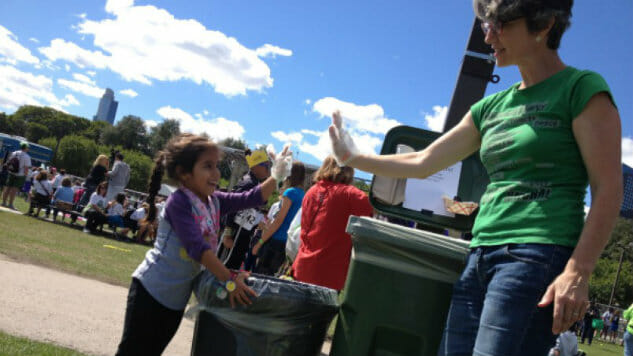Erlene the Compost Queen Is on a Mission to Make Composting Easy
Photos courtesy of Erlene Howard and Collective Resource
Composting gets a bad rap. Ask people why they don’t do it, and they’ll reply that it’s messy, ugly, dirty, smelly or just plain confusing and time-consuming. New York City residents have complained that the city’s pilot composting program stinks up the streets and attracts rodents.
But one woman in a second city is on a mission to change all of those preconceptions with easy, attractive — fun, even — composting programs.
Erlene Howard, a bookkeeper who loved to cook with lots of fruits and vegetables, was living in a condo in Chicago that lacked a back yard. Composting was challenging for Howard, and her own situation inspired her to make composting easier for city residents.

About one-third of the world’s food goes to waste — oftentimes because of a bruise on an apple, or a dent in a bell pepper, and other times because it simply didn’t make it from plate to mouth. But landfills themselves are creating ugly bruises on the face of earth, and Howard couldn’t stand to think that Chicagoans waste 55 million pound of food every month. With major cities like New York and Los Angeles already pioneering programs like LA Compost and the NYC Compost Project, she knew Chicago had to join the zeitgeist. Howard arranged to start a program that would pick up the food scraps from people’s homes and restaurants, rather than having them drop them off at common sites at community gardens.
Howard started Collective Resource out of her Toyota Camry with only three customers. Her warm, colorful personality soon endeared her to customers in Chicago communities. Howard made customers look forward to seeing her Camry pull around the bend and into their driveway.

The business has since grown to 475 residential and 100 commercial customers. She bought her first colorfully-decorated cargo van the first year of business, and now has three. The collections span from the South Loop of Chicago north to Lake Forest, along the North Shore. In the first six months, she collected one ton. Now her organization collects that amount every day. The average is 20 tons per week. In 2016, they celebrated a total collection milestone of 2,000 tons.
Howard realized that many customers didn’t actually consider the waste stream before planning an event or a party, so she began to offer zero waste event consulting, compost education, and event staffing. Now, ecoconscious party planners, companies and schools in Chicago can hire Collective Resource Zero Waste Consultants to select reusables or compostables for events, and will help manage the waste stream during and after an event. At events, Zero Waste Consultants aren’t there to wag fingers at guests throwing away disposable plates — instead, they seek to make waste education fun, kind and friendly for guests through colorful signage and easy explanations, especially for children.

Aptly-nicknamed Erlene “The Compost Queen,” says that she hopes for a sustainable model for entire communities such as Evanston, where her business began. She would love to see more localized composting options, so whole communities could feed into anaerobic digestion.
-

-

-

-

-

-

-

-

-

-

-

-

-

-

-

-

-

-

-

-

-

-

-

-

-

-

-

-

-

-

-

-

-

-

-

-

-

-

-

-










































